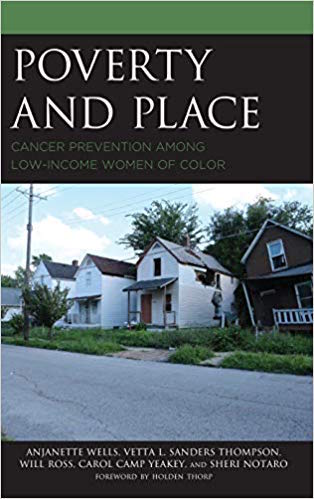A Washington University in St. Louis interdisciplinary initiative has sparked a wave of faculty research and the publication of a new book examining the incidence of cancer among low-income women of color in St. Louis and the Metro East communities of Illinois, including East St. Louis.

Published in January by Lexington Books, the interdisciplinary volume is titled “Poverty and Place: Cancer Prevention among Low-Income Women of Color.”
The book examines ways in which cancer health disparities exist due to class and context inequities even in the most advanced society of the world. It demonstrates the importance of place and the historical inequity in socio-environmental settings that have contributed to marked health disparities.
It is co-authored by current and former faculty and staff from Washington University School of Medicine in St. Louis, the Brown School and Arts & Sciences.
Contributors include Will Ross, MD, associate dean for diversity programs at the School of Medicine, professor of medicine and the newly named principal officer for Community Partnerships; Vetta Sanders Thompson, the E. Desmond Lee Professor of Racial and Ethnic Diversity in the Brown School; Carol Camp Yeakey, the Marshall S. Snow Professor in Arts & Sciences; Anjanette Wells, a former Brown School faculty member at the University of Cincinnati; and Sheri Notaro, associate dean for graduate student affairs and director of the Chancellor’s Graduate Fellowship Program in the Graduate School.
Provost Holden Thorp wrote the foreward for the volume. The research is a product of the “Bring Your Own Idea” interdisciplinary faculty grant program that Thorp’s office launched in 2014. The companion volume will be published by Oxford University Press in late spring 2019.
The authors support a new model of community engagement that focuses on individuals in their broader ecological context. In so doing, they seek to advance the art and science of community engagement and collaboration, while disavowing the “parachute” model of research, policy and practice that reinforces and sustains the problems associated with the status quo.
The book concludes with broader national policy considerations in the face of the erosion of the social safety net for America’s citizenry.



